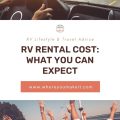Hey! This site is reader-supported and we earn commissions if you purchase products from retailers after clicking on a link from our site.
If you’re like me, you love the freedom that RV travel gives you. You’re able to go off the beaten path and explore parts of America that you would never get to see if you were going by plane. These days, you don’t even have to invest in an RV of your own. Peer-to-peer RV rental company services allow you to get the ultimate road trip experience on a budget.
If you’ve looked into such services, you’ve probably come across two names repeatedly: RVShare vs. Outdoorsy. These are two of the more prominent RV rental companies in the business and two of my top picks for the best RV rental company. Knowing which platform to choose if it’s your first time using a peer-to-peer RV rental platform can be challenging.
In this guide, I break down some of the critical differences between Outdoorsy vs. RVShare, allowing you to make an informed decision as a consumer.
Table of Contents
- A Quick Introduction to Outdoorsy and RVShare
- Outdoorsy vs. RVShare: Key Similarities and Differences
- The Process of Booking an RV Through RVShare or Outdoorsy
- Comparing Rental Inventory Between RVShare vs. Outdoorsy
- RVShare vs. Outdoorsy Prices: Which One Is the Better Deal?
- Comparing Insurance Coverage Between RVShare vs. Outdoorsy
- RVShare vs. Outdoorsy Customer Service Comparison
- Other Perks Compared
- The Final Word in the Great Debate: Outdoorsy vs. RVShare
A Quick Introduction to Outdoorsy and RVShare
Before we dive into the comparison, here are some quick facts about each platform.
RVShare 101
RVShare was founded by newlyweds Mark and Rachel in 2012. The duo bought an RV for their honeymoon, which took them on a road trip across the United States. Once the honeymoon was over, they realized they had no more use for the vehicle—but still had all the expense of maintaining it.
After trying to rent it out, they realized there was a lack of platforms to support peer-to-peer RV rentals. Today, more than 60,000 RV owners across the country use RVShare, making it the industry’s largest (and first) peer-to-peer RV rental marketplace.
Outdoorsy 101
Outdoorsy was founded by Jeff Cavins, Jennifer Young, and Tyler Stillwater. All outdoors lovers, wanted to help others discover the joys of RV-ing. The team did market research by talking to RV owners they contacted via Craigslist.
Through a series of interviews, they discovered that too many RVs were sitting around empty and unused—and that there was a generous community of RV owners ready to rent their vehicles to others.
Outdoorsy vs. RVShare: Key Similarities and Differences
Let’s start with the basics. How are these two RV platforms the same, and how are they different? Here are the highlights I consider essential.
Similarities
RVShare and Outdoorsy operate on the principle. Both are peer-to-peer platforms, similar to AirBnB – but for recreational vehicles (and also very different from something like Cruise America or El Monte). Instead of dealing with a formal RV rental company, you deal directly with an RV owner who is willing to let you borrow their ride for a fee. This direct contact can allow for a more efficient and streamlined process, in my opinion.
Outdoorsy and RVShare both offer some basic amenities to ensure a safe, secure, and satisfactory customer experience. Whichever platform you choose, you can expect:
- RV rental insurance
- Payment processing
- Roadside assistance
- Cancellation option (although policies as far as refunds vary)
Differences
Outdoorsy and RVShare essentially offer the same service and operate using the same service model. They also share the characteristics described above. However, they differ on a few critical points:
- Booking process
- Inventory accessibility
- Pricing model
- Rental insurance coverage
- Perks and add-ons
I go into more detail on these differences in the in-depth sections below. You can also check out my full RVShare review and Outdoorsy review for more.
The Process of Booking an RV Through RVShare or Outdoorsy
So, how does the process work? A prospective renter can search for RVs online using the given platform using filters like features, location, and vehicle type. The search results provide available inventory for you to browse.
Up to this point, the platforms operate the same way. But here’s where they start to differ.
With RVShare, you can rent an RV by contacting the owner directly through an embedded messaging system. You can get additional details about the listing and provide details about yourself to the RV owner. You can then click “Request to Book Option,” and the owner will accept or reject your request. If approved, you are directed to a secure payment system.
In contrast, Outdoorsy offers two means of booking a rental. The more comfortable option is to click the “Instant Booking” button once you find a vehicle you like. However, you can’t choose instant booking for all vehicles. In some cases, you need to request a reservation and wait for the owner’s approval. In most cases, this takes one to two days.
Comparing Rental Inventory Between RVShare vs. Outdoorsy
RVShare offers a diverse inventory, including A, B, and C-class RV rentals. The class determines the price—more on that below. You can also choose from a travel trailer, fifth wheels, toy haulers, pop-up campers, and more. Depending on the timing and where you’re located, you’ll probably be able to find thousands of options.
Outdoorsy boasts an inventory of more than 15,000 RV rentals. You will enjoy a diversity of styles to choose from, including essential RVs to luxury motorhomes. Although the inventory is significant, it’s not distributed evenly. One drawback of Outdoorsy is that it may be harder to find inventory in more rural regions.
RVShare vs. Outdoorsy Prices: Which One Is the Better Deal?
As mentioned, RV Share pricing is divided into classes. Various factors, from make to model and year, influence the price. There are also pet fees. Here’s a quick breakdown of how the costs stack up in general:
- Class A vehicles are generally from $150 to $250 per night for older models versus $350 to $450 per night for newer models.
- Class B vehicles are usually anywhere from $100 to $200 per night for older models versus $200 to $350 per night for newer models.
- Class C vehicles run from $100 to $200 per night for older models versus $225 to $400 for newer models.
Outdoorsy pricing likewise covers a vast range of classes and parallel price points. Smaller rentals with basic amenities seem to average about $50 to $100 per night, while larger rentals and luxury-style RVs generally run upward of $300 per night.
In addition to the fee you pay the owner, there are also Outdoorsy fees to consider, like protection package, service fee, and cleaning cost. Also, beware that some owners charge a mileage fee, so check whether you get free unlimited miles or not.
The bottom line is that you should do your research into all applicable fees on either site before booking. In either case, note that the owner, not the platform, sets the rental price.
Comparing Insurance Coverage Between RVShare vs. Outdoorsy
If you’re renting an RV, insurance is a must-have. In case something goes wrong on the road, you want to be sure that the damages are covered. This brings you and the RV’s owner alike peace of mind.
RVShare offers comprehensive rental insurance via an insurance company covering all kinds of events, including hail, wind storms, falling tree limbs, floods, vandalism, theft, fire, lightning, and animal collisions. The value of the coverage will depend on the type of RV rented.
For example, an RV valued from $0 to $9,999 will have an insurance fee of about $9.95 per day, while an RV valued upwards of $35,000 will have an insurance fee of $22.95 per day.
Outdoorsy offers coverage via Liberty Mutual Insurance company, including coverage of up to $250,000 for collision damage plus $1 million worth of liability insurance. The latter is useful if you’re in an accident that causes property damage or injures another person.
RVShare vs. Outdoorsy Customer Service Comparison
When it comes to comparing RV rental platform customer service, roadside assistance is a huge consideration. What happens if your vehicle breaks down? Fear not: RVShare and Outdoorsy both have you covered.
RVShare offers comprehensive roadside service, including towing, tire replacement, batter service, lockout service, extraction and winching, and emergency supply delivery.
Beyond actual roadside assistance, RVShare also offers top-quality customer service in general. You can contact them via online chat, email, or phone if issues arise. They also have a reasonably fast response time.
Outdoorsy likewise provides comprehensive aid via Coach-Net, which most of the RV owners on that platform rely on. This includes service appointments, 24/7 tech support, mobile mechanics, and emergency roadside service.
Like RVShare, Outdoorsy seems to have excellent customer service mechanisms in place. You can expect 24/7 access and various contact options (live chat, website help center, email, phone).
Other Perks Compared
One area where Outdoorsy shines is the extras. You can request add-ons like a grill, bedding, or permission to bring your pet when you book your RV. The RV owners on this platform also tend to get creative with their extras.
However, one RVShare perk worth mentioning is the 5% “cash back” option for customers. You can take these funds and put them towards future rentals and trips with RVShare.
The Final Word in the Great Debate: Outdoorsy vs. RVShare
So, which one is best – RVShare vs. Outdoorsy? I prefer Outdoorsy. I love the range of vehicles, the extra add-ons, and the top-notch customer service it gives me. That said, RVShare likewise offers a positive customer experience and a great selection of inventory.
To some extent, the platform you choose will depend in part on your location and what kind of inventory you’re looking for. Ultimately, it’s all about getting your dream vehicle for your perfect trip.





